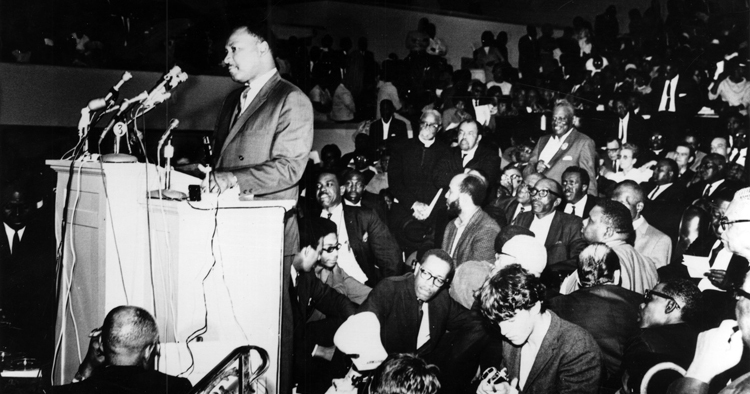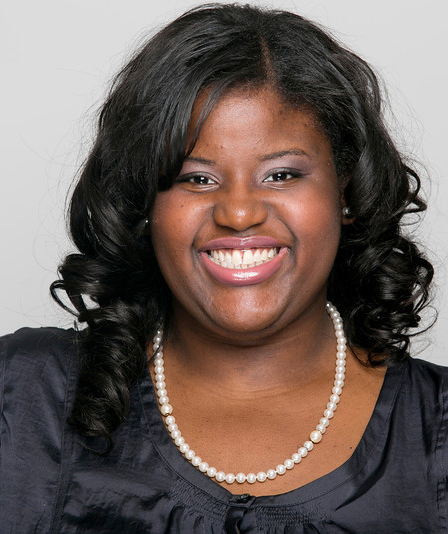
What happens to a dream, deferred?
The year 1963 marked a monumental moment for America, when the Civil Rights Movement launched nonviolent protest against segregation in Birmingham, Alabama, led by the young Black preacher and scholar the Rev. Dr. Martin Luther King, Jr. From the prison cell in Birmingham where King was arrested for his resistance efforts, King penned the “Letter from Birmingham Jail” to confront white Alabama clergymen who claimed the efforts of the protestors were “unwise” and “untimely.” Later that year, in his famous “I Have A Dream” speech at the 1963 March on Washington for Jobs and Freedom, King spoke of the “fierce of urgency of now” and why Black Americans could no longer wait for justice and equality with the refrain “Now is the time.” King proclaimed:
This is no time to engage in the luxury of cooling off or to take the tranquilizing drug of gradualism. Now is the time to make real the promises of democracy. Now is the time to rise from the dark and desolate valley of segregation to the sunlit path of racial justice. Now is the time to lift our nation from the quicksands of racial injustice to the solid rock of brotherhood. Now is the time to make justice a reality for all God’s children. [i]
King’s prophetic charge influenced the book Why We Can’t Wait (1964), which recounted the pivotal year while reflecting on the legal maxim “justice delayed is justice denied.”
On April 4, 1968, a 39-year-old dreamer was killed at the hand of a lethal concoction: white supremacist rage and gun violence. At the time of his death, King was marked by the Federal Bureau of Investigation as the “most dangerous man in America” and likely regarded as the “most hated man in America,” especially by white Americans. For the last 30 years, because of the persistence of the late Coretta Scott King, many Americans and over 100 countries remember and commemorate the life, ministry, and public witness of King each year. Today, Martin Luther King, Jr. is the only non-president and person of color whose memorial, the Stone of Hope, stands on the National Mall steps away from where he delivered his famous speech.
I have struggled to write this week about the enduring legacy of the Rev. Dr. Martin Luther King, Jr. in the age of a government shutdown that significantly impacts not just 800,000 federal employees but mostly Black and Brown lives who are required to return to work with no pay. While King is praised largely for his civil rights efforts, King also linked racial justice to economic justice.
Though 2019 marks 51 years since King’s assassination, the struggle for equality with equal citizenship and equal pay is far from over. King went to Memphis over 50 years ago to rally the city, lead the Sanitation Workers Strike, and advocate for hardworking Black men earning less than a livable wage (making a measly $1.80/hr.) with no benefits or days off. In his last speech, the night before his assassination in Memphis, entitled “I’ve Been to the Mountaintop,” King lamented about not knowing how long he would live but understanding his call to remain committed to “staying in the struggle until the end.”
I’ve been to the Civil Rights Museum, seen his dried blood that still settles in the cracks of the balcony of the Lorraine Motel, walked the suites where King and his comrades stayed, stood in the same place where he was shot dead. And I am still convinced that the struggle continues.
According to a recently released 2019 report by the Institute for Policy Studies, titled Dreams Deferred: How Enriching the 1 Percent Widens the Racial Wealth Divide, the wealth of white median families today is $146,984, which marks a 30 percent increase in the last 30 years. On the other hand, Latino and Black median household wealth persists at the poverty level. The wealth of Black median families has fared the worst in the last 33 years, plummeting from a record high of $12,000 in 1995 to $1,700 in 2013 and $3,400 in 2016. Such a reality situates Black median families on the path to zero wealth by 2082. [ii]
How convenient that America praises King now but still denies his quest for social change and revokes his call to “redeem the soul of America.”
Just this past Sunday, January 20, 2019, Vice President Mike Pence, appearing on CBS’ Face the Nation, quoted King’s words “Now is the time to make real the promise of democracy” in an attempt to compare President Trump and King’s efforts as synonymous, encourage Congress to come together for legislative action, and rally support for securing the wall at the Southern border. [iii] In the words of Childish Gambino, “This is America!” A nation that continues to serve the rest of us “a bad check” from a morally bankrupt economy of justice.
I have the same holy question that Harlem Renaissance poet Langston Hughes asked in his 1951 classic poem “Harlem”: What happens to a dream, deferred?
How do we write and teach and learn and live in the wake of freedom?
How do we #staywoke and avoid daydreaming (or being lulled into some false sense that a past or future time was/is better suited for justice-seeking)?
How do we call out the twisting of King’s words to secure the border and call in the demonstration of King’s witness toward equal citizenship for all those who continue to receive separate and unequal status in America?
[i] Martin Luther King, Jr., “I Have A Dream,” African American Theological Ethics: A Reader, ed. Peter J. Paris and Julius Crump (Louisville, KY: Westminster John Knox Press, 2015), 157.
[ii] Collins, Chuck, Dedrick Asante-Muhammed, Josh Hoxie, and Sabrina Terry. Report: Dreams Deferred. Institute for Policy Studies. January 15, 2019. Accessed January 21, 2019. https://ips-dc.org/racial-wealth-divide-2019/.
[iii] “Transcript: Vice President Mike Pence on Face the Nation, January 20, 2019.” CBS News. January 20, 2019. Accessed January 21, 2019. https://www.cbsnews.com/news/transcript-vice-president-mike-pence-on-face-the-nation-january-20-2019/.
 The Rev. Melanie Jones is the Crump Visiting Professor and Black Religious Scholars Group Scholar-in-Residence. Jones is a womanist ethicist, millennial preacher, and intellectual activist. As an emergent scholar in theological education advocating for social transformation in the church, classroom, and global community, Jones was quickly recruited to serve on the BRSG executive board. In her role as the BRSG director of social media and public outreach, she has poised herself as a leading millennial voice with a global public platform teaching in lecture halls and preaching in pulpits across the globe and traveling to cities in North America, Australia, the Bahamas, Bermuda, Ghana, New Zealand, and the United Arab Emirates. Her extensive teaching experience ranges from undergraduate teaching to graduate and seminary teaching in both face-to-face and online courses in humanities, theology, ethics, gender/sexuality studies and writing.
The Rev. Melanie Jones is the Crump Visiting Professor and Black Religious Scholars Group Scholar-in-Residence. Jones is a womanist ethicist, millennial preacher, and intellectual activist. As an emergent scholar in theological education advocating for social transformation in the church, classroom, and global community, Jones was quickly recruited to serve on the BRSG executive board. In her role as the BRSG director of social media and public outreach, she has poised herself as a leading millennial voice with a global public platform teaching in lecture halls and preaching in pulpits across the globe and traveling to cities in North America, Australia, the Bahamas, Bermuda, Ghana, New Zealand, and the United Arab Emirates. Her extensive teaching experience ranges from undergraduate teaching to graduate and seminary teaching in both face-to-face and online courses in humanities, theology, ethics, gender/sexuality studies and writing.
Melanie Jones is the co-curator of the #MillennialWomanism editorial forum, hosted on the recently launched Black Theology Project site. Her writings and sermons are accessible to scholars, students, and general society, as they are featured widely in popular digital and print publications, including The Feminist Wire, Chicago Theological Seminary Challenge & Response Magazine, The Forum for Theological Exploration Blog, Alpha Kappa Alpha Ivy Leaf Magazine, Sunday School Publishing Board — National Baptist Convention, USA, Urban Ministries, Incorporated, Urban Faith App, and ROHO. She is a third-generation Baptist preacher and the youngest ordained clergywoman at South Suburban M. B. Church in Harvey, IL, where she serves as associate minister and leads the women’s ministry. She earned a Bachelor of Arts in economics and political science from Howard University and a Master of Divinity, with a certificate in Black church studies from Vanderbilt University Divinity School. Currently, she is a Doctor of Philosophy candidate at Chicago Theological Seminary, and she was recently named a 2017–2018 doctoral dissertation fellow by the Louisville Institute.
BA, Howard University
MDiv, Vanderbilt University

